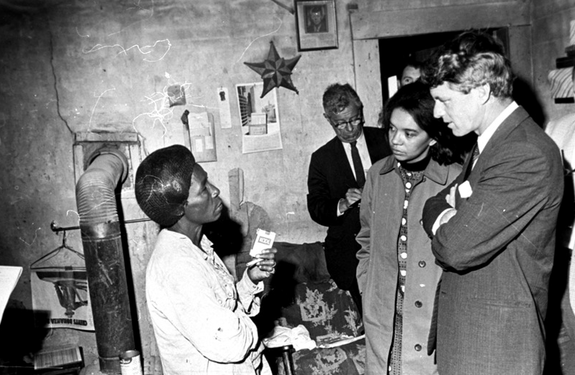Photo Credit: AP, courtesy of billmoyers.com
For anyone who didn't grow up in the rural South (including myself), it can be tough to readily understand the circumstances in which many children and families grow up. Barriers to two-way understanding - whether they be racial, class-based, gender-based, or otherwise - are real and must be acknowledged as we move forward, as they have deep historical and sociological implications - many of which I will devote later entries to. Given that the focus of this blog is to instigate conversations about the future of the rural South, I would offer that striving to include a diverse array of voices in discussing initiatives and projects that will improve quality of life for the persistently impoverished in the South is a critical element of ultimate success. Along with that, the importance of making progress out a desire for partnership rather than shame, guilt, or hate cannot be understated, as that is surely the more virtuous long-term path.
I'm talking about the power of empathy. The more we strive to empathize with one another, the clearer the vision for the future will become, and the more invested in that future we will be. (Apologies for Yoda-style syntax, but I couldn't figure out how else to word it.) I lay it out so simply not to be ignorant of the legacy of oppression in the South, but because distrust, pain, and ignorance are much easier to process and digest when empathy is the guiding light.
In an analogous fashion, leaders like Robert F. Kennedy (prodded by Marian Wright Edelman) and Jesse Jackson - though they had drastically different starting points - have sought to better empathize with poor, black citizens of the South through their own journeys to the region, specifically Mississippi - RFK in 1968, and Rev. Jackson in the mid-80s. In the clip below, which is about a notoriously impoverished neighborhood in Tunica, MS called the Sugar Ditch, you'll see Mike Wallace attempt to do the same, while also seeking to expand his understanding into a wider medium via his 60 Minutes piece.
Mr. Wallace and the Tunica residents he interviewed in 1985 have much to teach in this segment. I present it not as an end-all, be-all perspective of an individual neighborhood, though, but rather to make it clear how empathy requires persistence and an intentionally-build longitudinal understanding of a place and its people - a tall order for something as finite as a newspaper article or a news show segment. It takes time.
I'm talking about the power of empathy. The more we strive to empathize with one another, the clearer the vision for the future will become, and the more invested in that future we will be. (Apologies for Yoda-style syntax, but I couldn't figure out how else to word it.) I lay it out so simply not to be ignorant of the legacy of oppression in the South, but because distrust, pain, and ignorance are much easier to process and digest when empathy is the guiding light.
In an analogous fashion, leaders like Robert F. Kennedy (prodded by Marian Wright Edelman) and Jesse Jackson - though they had drastically different starting points - have sought to better empathize with poor, black citizens of the South through their own journeys to the region, specifically Mississippi - RFK in 1968, and Rev. Jackson in the mid-80s. In the clip below, which is about a notoriously impoverished neighborhood in Tunica, MS called the Sugar Ditch, you'll see Mike Wallace attempt to do the same, while also seeking to expand his understanding into a wider medium via his 60 Minutes piece.
Mr. Wallace and the Tunica residents he interviewed in 1985 have much to teach in this segment. I present it not as an end-all, be-all perspective of an individual neighborhood, though, but rather to make it clear how empathy requires persistence and an intentionally-build longitudinal understanding of a place and its people - a tall order for something as finite as a newspaper article or a news show segment. It takes time.
Empathizing can be tough in places where history reveals its marked, persistent absence; but its characteristics as a fundamentally human endeavor make it always within reach.
Until next time,
Travis
Until next time,
Travis


 RSS Feed
RSS Feed
